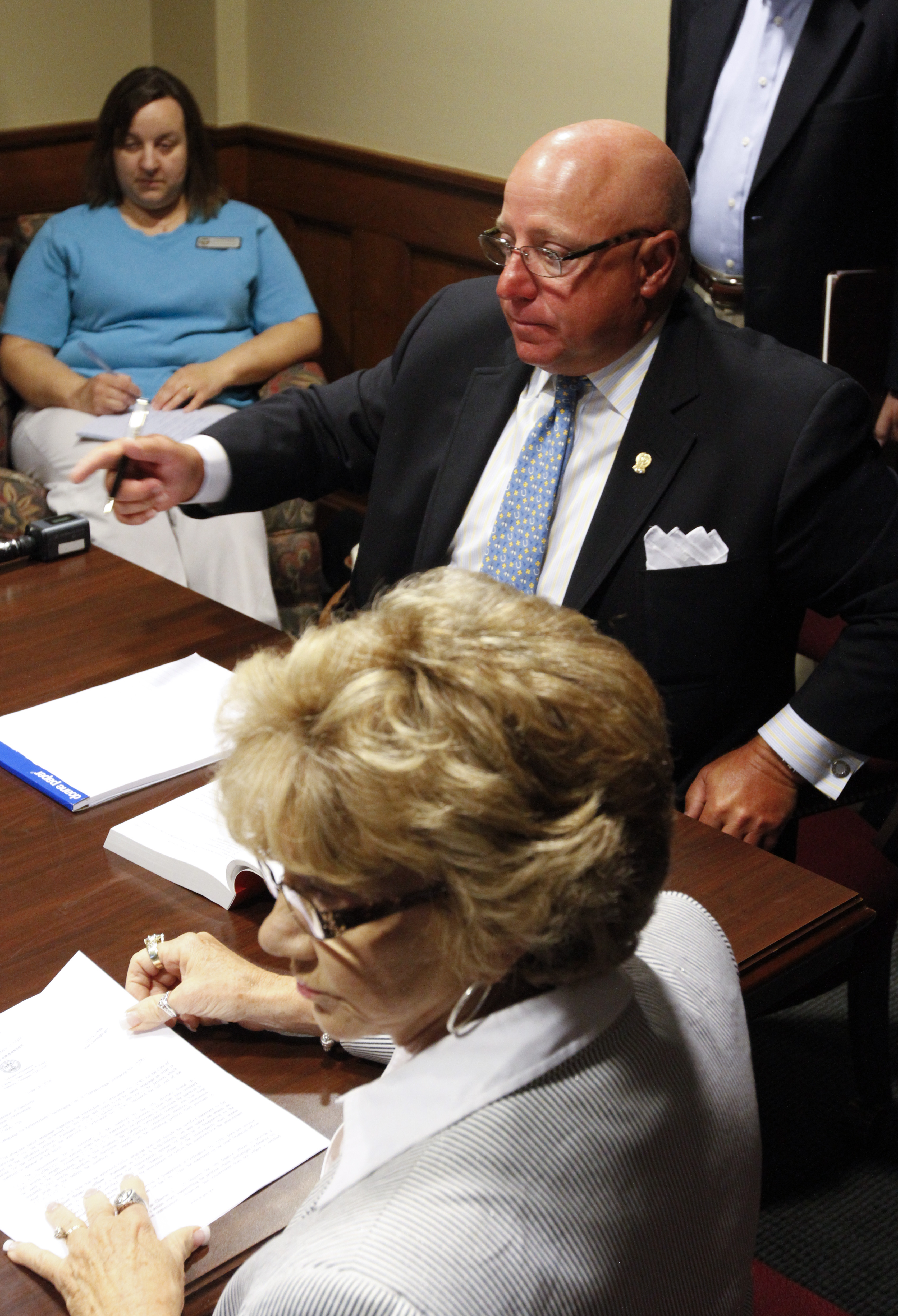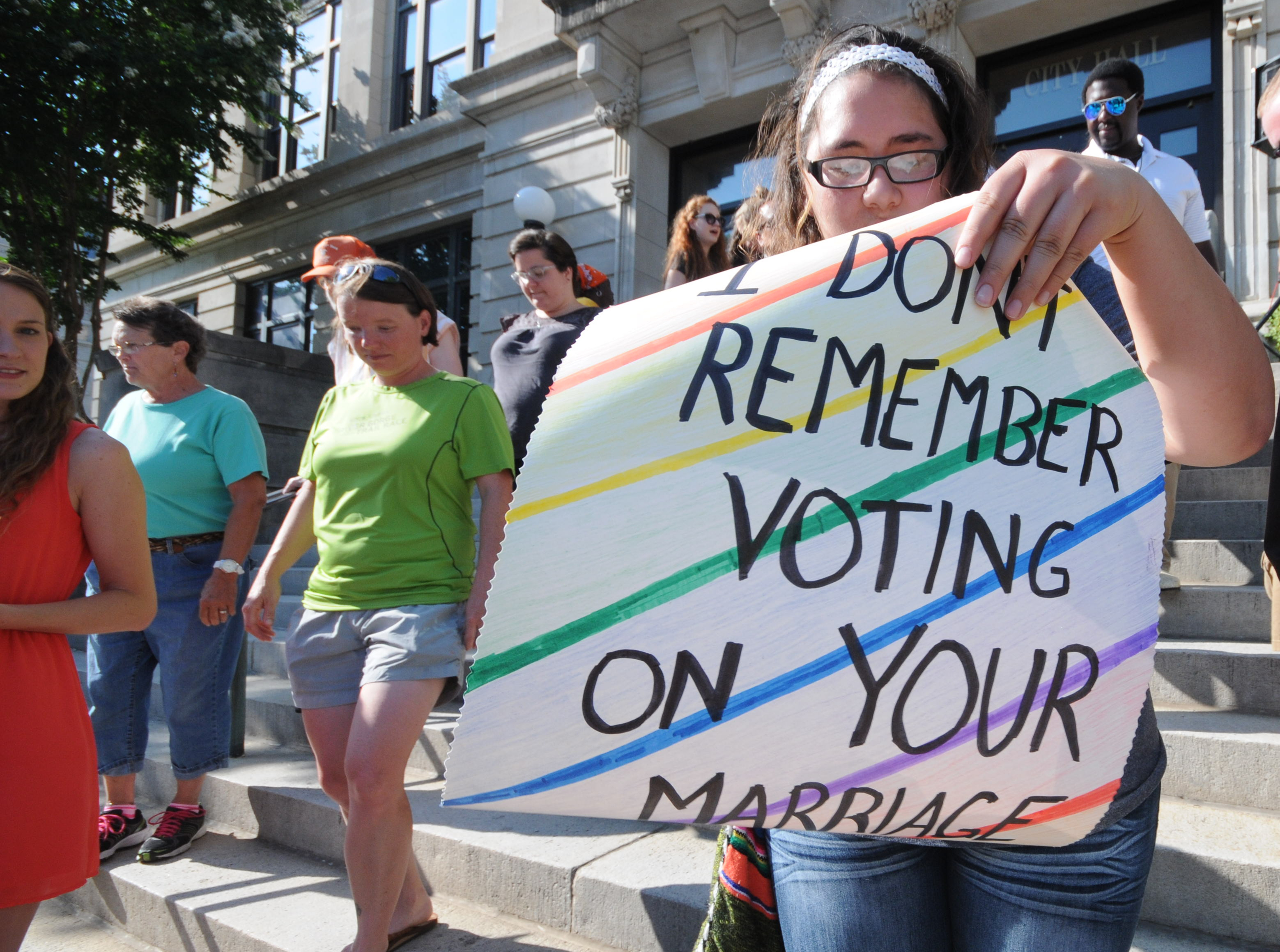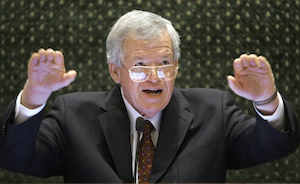THE BALLOT QUESTIONBelow is the ballot question concerning Chattanooga's employee domestic benefit policy."Shall the city of Chattanooga's 'domestic partnership' ordinance (Ordinance No. 12781) be adopted?"• For the ordinance providing for the extension of benefits in domestic partnerships and adding sexual orientation, gender identity and gender expression to the city's nondiscrimination policy.• Against the ordinance providing for the extension of benefits in domestic partnerships and adding sexual orientation, gender identity and gender expression to the city's nondiscrimination policy.
 Hamilton County Election Commission Chairman Mike Walden speaks to a small group after Circuit Court Judge W. Neil Thomas III ruled Monday that the ballot language written on the petition for the domestic partner referendum stands while at the Hamilton County Courthouse. Chattanooga objected to the language citing the city should write the question that voters see on the ballot but Thomas ruled in favor of the Hamilton County Election Commission.
Hamilton County Election Commission Chairman Mike Walden speaks to a small group after Circuit Court Judge W. Neil Thomas III ruled Monday that the ballot language written on the petition for the domestic partner referendum stands while at the Hamilton County Courthouse. Chattanooga objected to the language citing the city should write the question that voters see on the ballot but Thomas ruled in favor of the Hamilton County Election Commission.A judge's ruling Monday may not be the final word in a dispute over wording of a referendum that will go before voters on Aug. 7, but this much is clear:
The ballot says what the ballot says.
Hamilton County Circuit Court Judge W. Neil Thomas III ruled first thing Monday morning that the people who sponsored the petition challenging a city ordinance that grants benefits to the gay and straight partners of city workers get to write the ballot question, in keeping with state law.
Four hours later, the ballots were being printed with the petitioners' wording intact.
Even so, the city of Chattanooga filed an immediate appeal of Thomas' decision.
The city claimed in its original suit against the Hamilton County Election Commission, filed last week along with that of Chattanooga police Lt. Corliss Cooper, that City Charter allows the city attorney to write a summary of the ordinance for the ballot so voters know more about what they're voting on.
"It is important our residents have convenient access to the most information available to assist them in voting on a city issue," said City Attorney Wade Hinton in a prepared statement related to the appeal.
Election Commission officials say their June 27 decision to approve the ballot language submitted by the conservative group Citizens for Government Accountability and Transparency over wording submitted by the city attorney wasn't about whose question was more fair or accurate.
It came down to what the law says, said Hamilton County Election Commission attorney Chris Clem.
And in the end the court agreed, he said.
"We look at who gets to draft the question, not who gets to draft the better question," Clem said.
But those with a personal stake in the decision say the judge's ruling is unfair.
"That question, it's going to mislead people," said Cooper.
In protest, a group of residents in favor of the domestic partner ordinance gathered late Monday afternoon at City Hall.
Same-sex married couples, relatives of people who are gay and people promoting equality for all residents were among more than 40 people who stood outside to advocate for the ordinance. They promised to knock on their neighbors' doors and encourage people to support the ordinance on Aug. 7.
City Councilman Moses Freeman was among those who addressed the crowd.
"I've been knocking on doors," said Freeman. "My message is to go forward. Prove to the world that we are a fair people and we welcome all people to our community."
City Councilman Chris Anderson, who proposed the ordinance, spoke about equality.
"Don't we want to be known as a city for fairness and equality for all?" he asked the crowd. "Will you help make Chattanooga a better place for everyone?"
"Yes," they chanted.
The domestic benefits measure was approved by the City Council in November, with implementation scheduled for July 1. However, implementation was blocked after the conservative group's petition drive gained enough signatures to put the question to a public referendum.
CGAT leader Mark West, who is also president of the Chattanooga Tea Party, said the city's suit was a waste of time in the first place. He said his group followed the law carefully and wrote a fair question that sums up what people signed when petitioners went door to door collecting nearly 8,000 signatures city wide.
"We followed [election officials'] direction specifically so we wouldn't end up in court and yet here we were, or are," West said. "But we're thankful that Judge Thomas read the law and followed the law."
But the city attorney's office argues even if Thomas' ruling stands, the city should consider re-examining the referendum process to require city participation on important issues related to the City Charter.
Council Chairman Chip Henderson, on the other hand, says the current process is the ultimate example of "government for the people and by the people."
"From that standpoint it would make sense that they brought the imitative forward and it should be their wording," said Henderson, who was one of four to originally vote against the domestic partner ordinance.
Staff writer Yolanda Putman contributed to this report.
Contact staff writer Joy Lukachick at jlukachick@timesfreepress.com or 423-757-6659.


